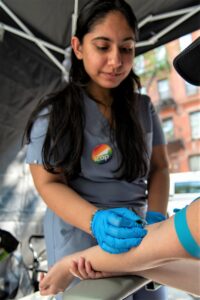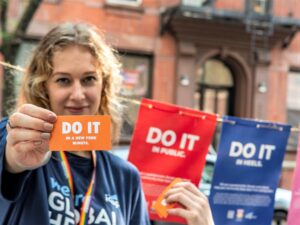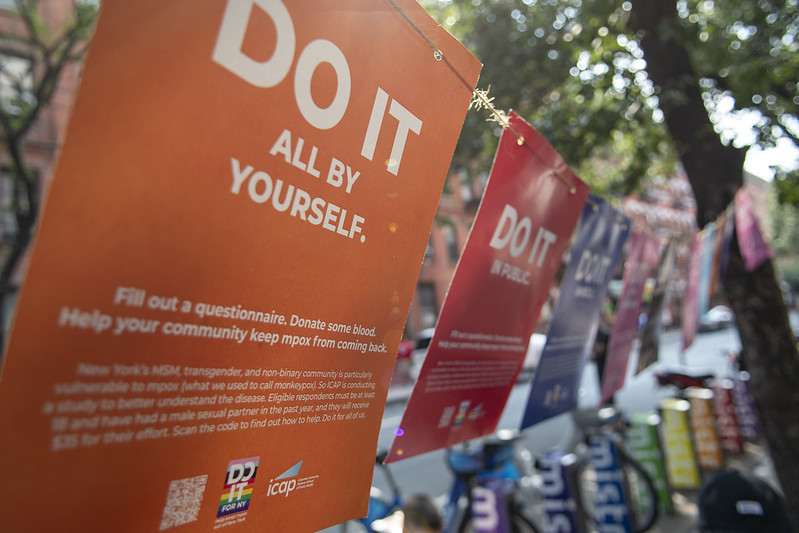Last summer, mpox, a previously rare disease, suddenly emerged in 113 countries, including the United States. Mpox is related to smallpox and was known to cause flu-like symptoms. Last summer’s outbreak, however, was especially challenging because the illness also caused very painful skin sores, including genital sores. The illness is caused by the mpox virus—formerly called monkeypox—and affected the men who have sex men (MSM) community in particular. Since 2022, a total of 30,671 confirmed cases have been reported in the United States, 13 percent of them in New York City. Globally, over 88,600 cases have been diagnosed in 113 countries.
Many questions remain about the magnitude of last year’s mpox outbreak in the LGBTQ+ community. To understand the impact at the community level, ICAP has launched a seroprevalence study of mpox in New York City among self-identified men, transgender, and non-binary people who have had sex with men within the previous year. ICAP is conducting street-based recruitment in LGBTQ+ communities such as Hell’s Kitchen and consenting individuals answer a brief questionnaire and provide less than a teaspoon of blood. The US Centers for Disease Control and Prevention is analyzing the blood samples for mpox antibodies, which indicate a previous infection, vaccination, or both infection and vaccine-derived immunity. The results may also shed light on the frequency of asymptomatic infection.
“Early last summer, as mpox began to emerge, it was unclear how many people in the United States were at risk of acquiring mpox,” said Jessica Justman, MD, ICAP’s senior technical director and the principal investigator for the study. “Then in just a few months, the US had 20,000-plus cases. While this was not as widespread as the COVID-19 pandemic, it all felt uncomfortably similar and raised many questions.”

ICAP is conducting street-based recruitment in LGBTQ+ communities such as Hell’s Kitchen and consenting individuals answer a brief questionnaire and provide less than a teaspoon of blood.
The study is the first of its kind for mpox in New York City. Public health officials believe the true number of people affected by mpox is much higher than what has been reported, in part because so few people knew about the illness. Meanwhile, the health community was aware, but lack of preparedness—coupled with medical mistrust and low insurance coverage—were barriers to testing.
“There isn’t a lot of information on the magnitude of last summer’s outbreak,” explained Joey Platt, a senior project officer at ICAP and a co-investigator on the study. “The scale-up of testing was delayed, there was stigma, and we didn’t have adequate data collection methods to measure the impact of this outbreak on New York City and on the LGBTQ+ community specifically. It’s important to look at that, even retrospectively, to understand the disease more and to improve future disease response in terms of mpox.”
ICAP designed and developed the survey and is administering it with support from New York Community Trust, the Foundation for AIDS Research (amfAR), and the U.S. Centers for Disease Control (CDC), which is providing antibody testing services. McCann Global Health provided pro bono marketing and design services.
The study launched street-based recruitment in June, which is Pride month. Platt said she has been struck by the number of participants who have turned down the $35 incentive and insist they want to participate purely from a desire to help increase knowledge and research about a virus that affected the LGBTQ+ community.
“A lot of people in the LGBTQ+ community have personal experience with mpox and they remember how scary it was in the beginning,” Platt explained. “Either they have been diagnosed previously themselves or they have friends who were affected.”
Along with collecting a small sample of blood, ICAP staff administer a brief questionnaire that assesses health history, mpox risk factors, mpox vaccination status and history, and demographic information.
“There is not a lot of data on the durability of mpox vaccine effectiveness, and since we have seen breakthrough cases already this summer, we are looking at the prevalence of detectable antibodies now, one year later,” Platt said. “It’s important to understand the level of protection after vaccination. Even though the outbreak happened last summer, people are wondering ‘do I need another vaccine?’”

ICAP designed and developed the survey and is administering it with support from New York Community Trust, the Foundation for AIDS Research (amfAR), and the U.S. Centers for Disease Control (CDC), which is providing antibody testing services. McCann Global Health provided pro bono marketing and design services.
“We are also hoping to be able to differentiate between vaccine-induced immunity and previous infection-induced immunity,” she added.
ICAP has over 14 years’ experience with conducting surveys, including over 20 Population-based HIV Impact Assessments (PHIAs) in sub-Saharan countries and a variety of COVID-19 surveys in Africa and in the U.S., including street, phone, and internet surveys in New York City that evaluated COVID-19’s burden in specific neighborhoods, among elderly residents, and LGBTQ+ adults.
“ICAP remains committed to learning more about emerging health threats in order to improve the health of New York City and its diverse communities,” Justman said.
About ICAP
A major global health organization that has been improving public health in countries around the world for two decades, ICAP works to transform the health of populations through innovation, science, and global collaboration. Based at Columbia Mailman School of Public Health, ICAP has projects in more than 40 countries, working side-by-side with ministries of health and local governmental, non-governmental, academic, and community partners to confront some of the world’s greatest health challenges. Through evidence-informed programs, meaningful research, tailored technical assistance, effective training and education programs, and rigorous surveillance to measure and evaluate the impact of public health interventions, ICAP aims to realize a global vision of healthy people, empowered communities, and thriving societies. Online at icap.columbia.edu








